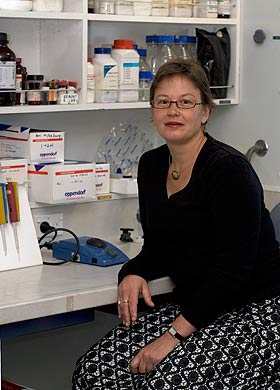
 Dr Lisa Stamp
Dr Lisa Stamp
“There's no reason why more people cannot effectively be cured of gout following these findings.”
Rheumatologist Dr Lisa Stamp could have been a professional musician – a cellist – but half way through a Bachelor of Music degree she decided to be a doctor instead.
Although she is still loves music and the cello, her focus is now on trying to improve the welfare of patients through research into the painful and crippling disorders, rheumatoid arthritis and gout.
"We've got a really high and increasing prevalence of gout in New Zealand and, although people joke about it, if you've got it, you don't!" she says with emphasis.
"It's a very, very painful disease: it is not to be underestimated – it restricts people's lives and often limits their mobility and, if left untreated, can cause permanent and serious joint damage."
Stamp is a recipient of an Early Career Award for Distinction in Research and her work at the University of Otago, Christchurch could make a significant difference for gout sufferers.
She has confirmed, for the first time, that when the dose of the standard drug treatment, Allopurinol, is increased above the clinical guidelines, most gout patients show a big improvement. This research shows that the existing guidelines are probably too conservative with too few patients showing improvement.
"The study by the team who worked on this demonstrates what many have thought would be the case. There is a significant lowering of uric acid levels in the blood in 86 per cent of gout patients if you lift the dosage of Allopurinol above the recommended range – and there are few, if any, side effects. "While we need larger studies, this will make a difference because now doctors should feel more confident about increasing the dosage of Allopurinol, depending on the patient. There's no reason why more people cannot effectively be cured of gout following these findings."
Rheumatoid arthritis, which cripples thousands of New Zealanders, is even more challenging. Drug treatments have evolved rapidly in the last few years, but the difficulty is predicting who will respond best to which drug. In other studies, the Rheumatology Immunology Research Group has been measuring blood levels of the frontline drug Methotrexate to ascertain whether there is a relationship between drug levels and control of rheumatoid arthritis, and whether oral application or injection is best. At the same time, genetic research is also underway to better target drugs to particular patients.
Stamp works with the Leukocyte Inflammation Research Laboratory, in Dunedin, using joint tissue samples from patients with rheumatoid arthritis to see if differences can be identified that will indicate severity of disease and predict response to specific treatments.
"Essentially my research to date is trying to improve treatment and management of very difficult and varied diseases, to make it more accurate and effective," she says.
Funding
- Health Research Council of New Zealand
- Arthritis New Zealand
- Lottery Health Research
- Canterbury Medical Research Foundation